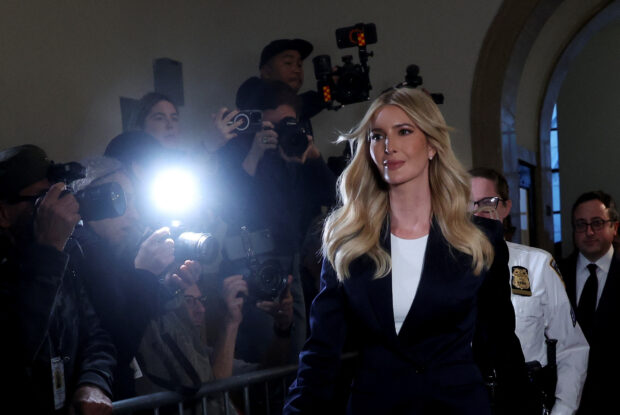Emails in NY fraud trial show Trump’s daughter worried about his wealth

Former U.S. President Donald Trump’s daughter Ivanka Trump attends the Trump Organization civil fraud trial, in the New York State Supreme Court in the Manhattan borough of New York City, U.S., November 8, 2023. REUTERS/Shannon Stapleton
NEW YORK — As Donald Trump sought to buy a Florida golf course in 2011, his daughter Ivanka expressed concern that he was not wealthy enough to close the deal, according to evidence presented Wednesday in a civil fraud trial that threatens the former U.S. president’s business empire.
The emails and other documents were presented as New York state lawyers wrapped up their case, which argues that Trump and his company inflated his net worth by as much as $2.2 billion to win better financing terms.
They are seeking more than $250 million in penalties and restrictions that could strip Trump of some of his best-known trophy properties.
READ: Trump sons grilled on stand in New York civil fraud trial
Testifying as the state’s final witness, Ivanka Trump sought to distance herself from the questionable valuation methods that have already been ruled fraudulent by the judge overseeing the trial. She acknowledged that she worked on real-estate deals for the company but was not involved in calculating Trump’s net worth.
“I generally understood that there was a personal guarantee,” she testified. “This level of granularity was not something that I can sit here today and say that I recall.”
Article continues after this advertisementIvanka’s testimony concluded in the afternoon. Trump’s lawyer Christopher Kise, said he would ask Engoron to resolve the case in the defense’s favor on Thursday, though he is unlikely to prevail.
Article continues after this advertisementThe lawsuit by New York Attorney General Letitia James, a Democrat, accuses Trump and his family businesses of manipulating real estate asset values to dupe lenders and insurers and embellish Trump’s reputation as a successful businessman.
Trump has acknowledged on the witness stand that some of the estimates of golf courses, office towers and other company assets were inaccurate, though he said many were undervalued.
Unlike her siblings and father, Ivanka Trump is not a defendant in the case. She joined her father during his 2017-2021 term in the White House, leaving her brothers in charge of the company during that time.
But James said she nevertheless benefited from the company’s fraudulent financial statements.
“She was enriched. And clearly, you cannot distance yourself from that fact,” James said after his testimony.
As a top executive at the Trump Organization between 2011 and 2017, Ivanka said she focused on redeveloping the Doral golf course in Florida and the Old Post Office property in Washington.
Concerns about Trump net worth
At the trial, she was shown a 2011 email in which she acknowledged that a requirement by lender Deutsche Bank that her father maintain a net worth of at least $3 billion was a problem but encouraged company officials to approve it anyway.
“We wanted to get a great rate and the only way to get proceeds/term and principal where we want them is to guarantee the deal,” she wrote to a Trump Organization lawyer.
The two sides ultimately agreed to set the net-worth requirement at $2.5 billion, even though her father claimed a net worth of $4.3 billion that year.
READ: Trump hit with criminal charges in NY, a first for a US ex-president – New York Times
She was also shown a 2011 email from the federal government expressing concern about irregularities in Trump’s financial statements as the company proposed redeveloping the Old Post Office, a federal property. Other evidence showed she profited personally from that deal.
She again said she did not recall specifics. “There were many emails, many conversations,” she said.
Ivanka’s poised and polite presence on the witness stand stood in contrast to the sullen performance by her brother Eric last week and the defiant and rambling testimony of her father on Monday. Under friendly questioning by her lawyer Jesus Suarez, she described Deutsche Bank’s approval of the company’s upgrades to the Doral resort.
“They saw firsthand the extraordinary change in what the asset had become,” she said.
Trump, who leads his rivals for the 2024 Republican presidential nomination despite a maelstrom of legal troubles, has denied wrongdoing and accused James and Justice Arthur Engoron of political bias.
Trump acknowledged on the witness stand that valuations for his properties were not always accurate but said the errors were irrelevant to the financial institutions that used them to price deals.
His sons, Donald Jr. and Eric Trump, testified last week that the financial documents at the heart of the case were not their responsibility, though emails and other documents showed they may have been more involved than their testimony indicated.
In a ruling that found Trump, his adult sons and 10 of his companies liable for fraud, Engoron described how the defendants concocted valuations in scathing terms. His ruling could strip Trump’s control of some of his best-known properties, though that order is on hold during appeal.
In addition to this case, Trump is a defendant in four separate criminal cases, including two stemming from his attempts to overturn Democrat Joe Biden’s 2020 presidential election victory.
Nevertheless, opinion polls show he holds a commanding lead over Republican rivals to face Biden next year.